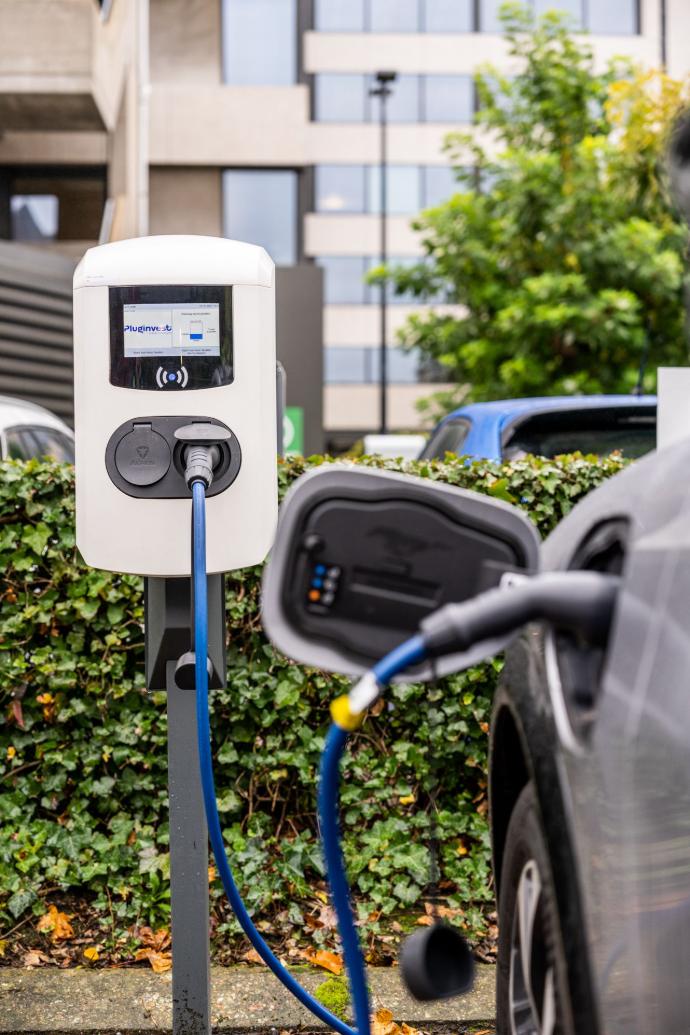UPDATE: 09.2025

Are you self-employed or looking to provide charging stations for your business?
Basic deductions
For small Flemish companies, according to the tax definition, a basic deduction of 10% of the investment deduction for charging infrastructure applies. Specifically, this applies to sole proprietors, liberal professions and small companies. (source: Vlaio)
Increased thematic deductions
These Flemish deductions apply as follows:
-
40% deduction for sole proprietors and small companies
-
30% deduction for larger companies
This deduction applies to charging infrastructure for zero-emission freight vehicles, buses and coaches. It must also cover investments of at least €1,000. However, this deduction cannot be combined with the "Ecologiepremie+". (source: Vlaio)
Other grants
In Flanders, companies can also apply for the Ecology Premium Plus for fast chargers and the annual subsidy call of the Clean Power for Transport (for 2025, no call has been launched yet). Finally, the Ecoboost loan is also available in Flanders for self-employed persons, SMEs, and non-profits. No additional support measures currently apply in the other parts of the country.
Are you a private individual?
At this time, there are no more tax deductions for private individuals, regarding the purchase or installation of a charging station, since these tax rulings expired in August 2024. There are many ongoing discussions on such beneficial measures for charging stations at various levels of government.
However, there is no clarity so far on concrete plans for new tax rules for individuals wishing to install charging stations.
If you would find the initial investment in a charging station too demanding, our Charging-as-a-Service (CaaS) formula might be of interest to you! This leasing formula allows you to spread the cost of the charging station over a number of years, making the installation of a charging solution a lot more accessible. You can find more info on our CaaS page.

Fiscal rules on Electric Vehicles (Full EV) and Plug-in Hybrids (PHEV)
Full EV
In the Flemish Region, you are fully exempt from the registration tax (BIV) when purchasing a 100% electric vehicle (Full EV). However, this exemption will gradually be phased out starting in 2026.
In the Brussels-Capital Region, you pay a registration tax of €74.29 for a Full EV.
In the Walloon Region, the minimum BIV amount will be only €50 as of 1 July 2025. However, from that date, a calculation will also be applied based on, among other things, the vehicle’s power, meaning that even electric vehicles may sometimes pay slightly more than the minimum amount.
Plug-in Hybrid (PHEV)
Plug-in Hybrids and other types of Hybrids are subject to a modified scheme that depends on several factors, including the CO2 contribution.
For this, we would like to refer you to the simulation tool of the Flemish Tax Administration. This legislation applies throughout Belgium.
Full EV
In the Flemish Region, you are fully exempt from road tax when purchasing a 100% electric vehicle (Full EV). This is still subject to a potential legislative change, though it remains unclear whether this change will take place.
In the Brussels-Capital Region, Full EVs are subject to the minimum rate of €102.96.
In the Walloon Region, you also pay the minimum road tax of €102.96 for a 100% electric vehicle.
Plug-in Hybrid (PHEV)
For (Plug-in) hybrids, the same calculation of the CO2 contribution applies to obtain the road tax. For this, we refer to the calculation of the CO2 contribution for non-Full EVs.
Do you have a company car that you also use privately? Then you will pay less BIK costs than owners of diesel, petrol, LPG, or natural gas cars.
The BIK calculation is based on the car’s catalogue value, CO₂ emissions, fuel type, and registration date.
Full EV
For an electric company car, the BIK calculation uses the lowest CO₂ coefficient, which is 4%. The full calculation is as follows:
==> Catalogue value x 4% x 6/7 x vehicle age coefficient
Plug-in Hybrid (PHEV)
For PHEVs, the same rules apply as for fuel-powered cars, as they also run on petrol or diesel. More details on this calculation can be found here (section 4).
TIP: Our partner LIZY has designed a handy tool to calculate your car’s BIK. You can find it here: www.lizy.be/nl/tools/vaa-berekenen
Currently, there are no (local) premiums or subsidies available for the purchase of electric passenger vehicles, nor for plug-in hybrids.
Are you self-employed or run a business? Then the purchase of an electric car is 100% tax deductible at this moment. You also deduct 100% of the electricity you use for electric vehicles from your taxes.
Besides, between 2023 and 2026, the government will phase out tax breaks for fuel cars. Hybrid cars will also be treated differently from 2026 onwards Thus, only the most fuel-efficient hybrids (emissions of less than 50g CO₂ / km) fall under the specific tax deductibility rules for hybrids. The (provisional) deductibility tables can be found on the website of FEBIAC.
Tax deductibility for (plug-in) hybrids again depends on CO2 emissions. For this, it is best to consult the table from the Belgian government on the MinFin website.
So from 2026, only fully electric (BEV) company cars will be 100% tax-deductible and only some PHEV models will be tax-deductible!